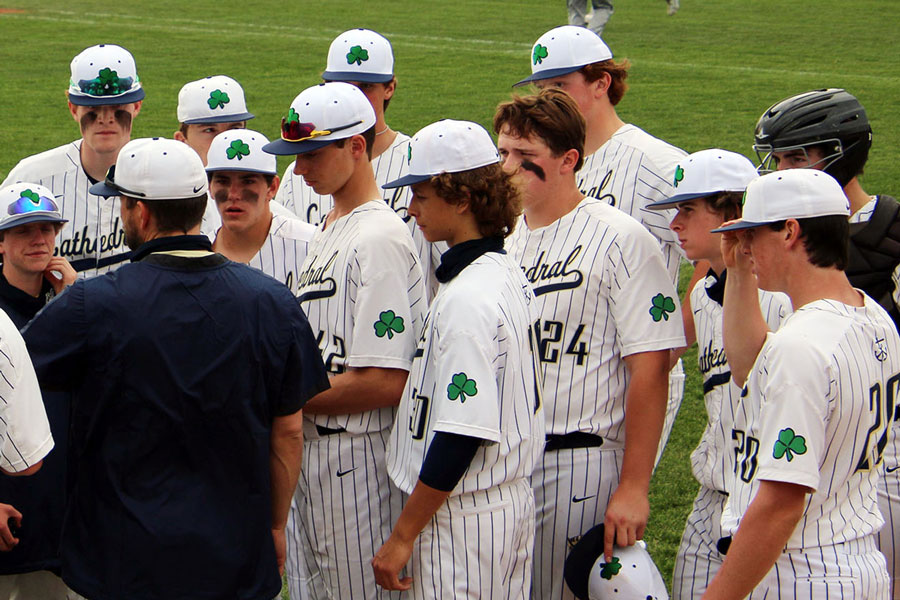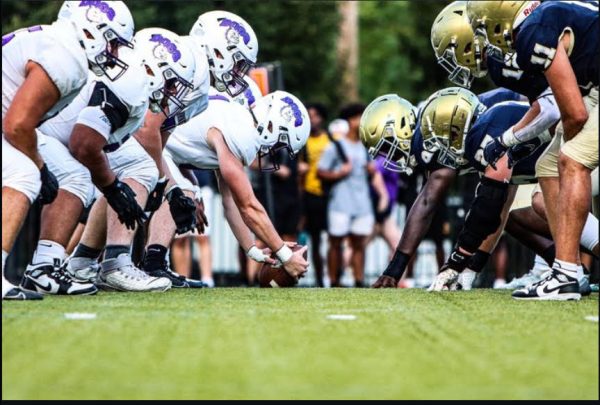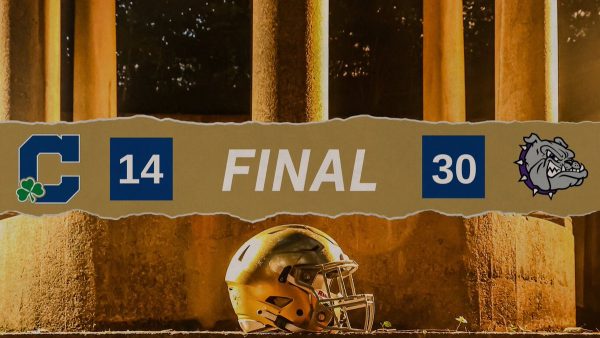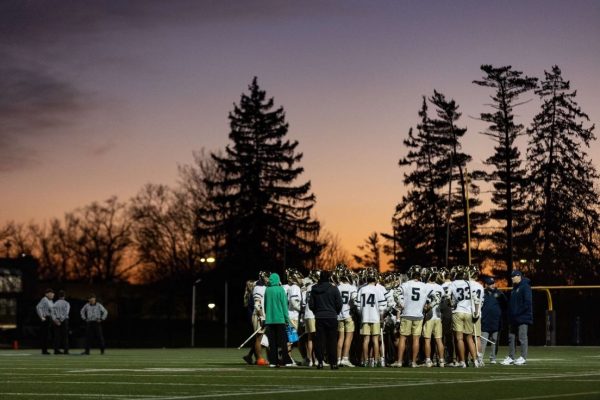JUCO is a viable option for high school athletes
Three baseball players explain why they chose junior college
During last spring’s regular season game against Franklin Central, Assistant Coach Mr. Jeremy Sinsabaugh addresses the Irish between innings. Dylan Haslett (#20) entered the game out of the bullpen, tallying three shutout innings en route to his first save of the season.
With the ever-growing role of social media in athletes’ recruitment and the rise of YouTube content creators such as Eric Sim, JUCO baseball seems to be growing at a higher rate than ever.
Sim, the King of JUCO, along with the JUCO bandits, have helped to legitimize JUCO baseball as a viable route for high school athletes looking to play at a higher level.
“JUCO bandits are known for having chips on their shoulders,” senior baseball player Dylan Haslett said. “They don’t have the facilities and equipment that Division I schools have; however, that doesn’t affect them because they tend to overcome any adversity they’re faced with,” he said. Haslett, who is committed to Oakland University in Auburn Hills, Michigan, plans to pitch for the Golden Grizzlies in the Horizon League during his college career.
Though he is playing in Division I, he understands that any athlete who can compete beyond high school has accomplished a difficult task. “Playing (in college) is an accomplishment in and of itself regardless of whether it’s D-I, D-II, D-III, NAIA or JUCO,” he said. “Playing a sport at the next level is going to require lots of time. There is no magic bullet that will all of a sudden make you good, so you can’t try to avoid the hard work it takes.”
Community college baseball, also known as junior college baseball and more commonly known as “JUCO” baseball, provides an alternative to traditional collegiate baseball. Junior colleges present players with two additional years of development, allowing them to test the waters of baseball beyond the high school level and giving them opportunities to see the levels at which they could thrive.
In addition, JUCO rules are more lenient in comparison to NCAA and NAIA rules. JUCO baseball allows for more practice time and competition throughout the academic year, while the NCAA baseball season begins in mid-February and NAIA competition kicks off shortly after. To further bolster the case for JUCO baseball, players who take this route are eligible for the Major League Baseball draft from day one and can transfer to a four-year university without penalty.
One such athlete who elected to play JUCO baseball is Kyle Cortner ‘20. Cortner is in his second year at Lincoln Trail Community College, and the Cathedral baseball alum said that he chose JUCO partly due to the outbreak of the coronavirus, which occurred just before the start of his senior season. “The four-year schools allowed their seniors to come back for an extra year, which meant (there would be) less room for incoming freshmen such as myself,” he said.
Another upside for Cortner includes the academic aspect of his college experience at Lincoln Trail. “At the junior college level, I am taking courses I would take at a larger university, but they’re cheaper, and most if not all (course credit will transfer) to larger universities,” he said.
The academic allure of JUCO is quite inviting to many high school athletes; not only is it significantly cheaper, but the eligibility requirements are not as stringent. For students who may have struggled with grades during high school, JUCO provides an opportunity to right the ship and earn a GPA which will grant them eligibility at a four-year university.
Senior Nick Bassi will take his considerable baseball talents along I-70 and play for St. Charles Community College in 2022. Although NCAA Division I was his original goal, Bassi said he is still happy with going the JUCO route. “I chose to go JUCO because I believe I can eventually work my way to Division 1 baseball,” Bassi said. “I did not get the looks from the schools I wanted, which pushed me towards St. Charles. They will push me to be the best player I can be. JUCO also gives me two extra years to think about what I want to do later in life,” he said.
While Bassi discerns his career path, the 6-foot-3, 195-pound right-handed pitcher will have the opportunity and resources to hone his skills both in the classroom and on the diamond.
For any athletes looking to play their chosen sport beyond high school, Bassi echoed Haslett’s sentiment about the legitimacy of JUCO athletics. “If you truly love your sport and want to play at the next level, I highly recommend choosing the JUCO route. There’s nothing wrong with going that route and choosing to take two years to develop,” he said.
As time winds down and the number of days until graduation decreases, Bassi and Haslett will continue to prepare for their final season with Cathedral varsity baseball, which is set to commence in late March 2022.
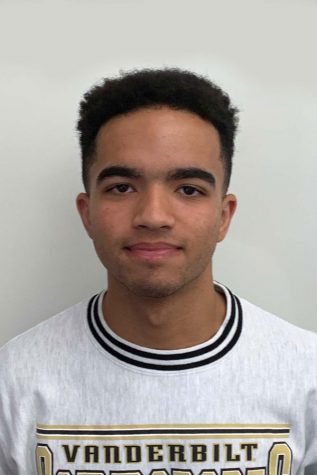
Nicholas Rodecap is a senior and co-editor-in-chief of the Megaphone. At Cathedral, he is a drum major in the Pride of the Irish marching band, a varsity...


